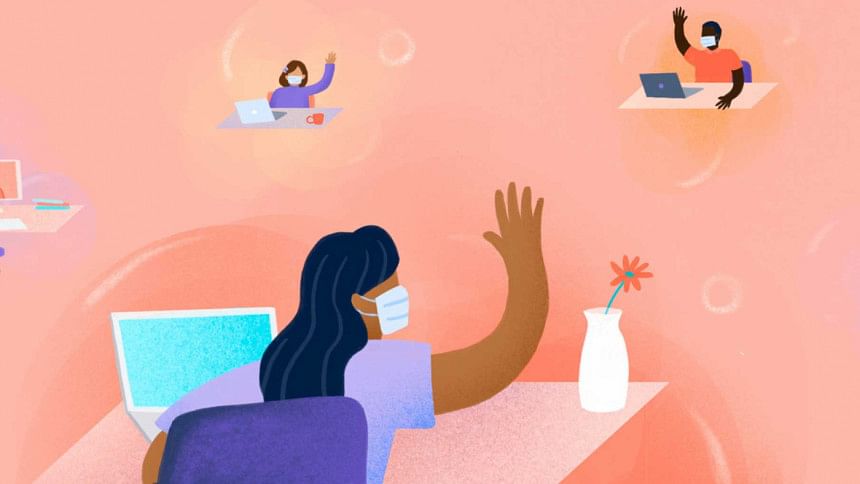The inevitability of the ‘new normal’

The new normal is now normal! Four years back, seeing us sitting at the coffee table with our masks, disposable gloves and sanitiser bottles, people would have chuckled and called us abnormal. But today they won't. How the world has gone topsy-turvy with millions of deaths—and our sense of normalcy has taken a 360-degree turn!
Imagine being forced to fight a "not so normal" adversary, and after failing to win the war, forced to accept the enemy's terms of surrender—discard beautiful old habits like going out to dance and dinner or cooing and cuddling in the park, and so on. Instead, stay indoors, watch stale programmes on TV and die of mediocrity. If we are still alive, we have to wear masks, sanitise our hands, and order food online. Losers have no choice!
Life has been a continued process of adjustment. Since taking the first gasp after birth, humans have been engaged in the constant struggle to adjust to a new environment. From the safety of the mother's womb, the baby comes to live in the bacteria-infested world. The infant has to survive, so instinctively, it turns towards its mother for sustenance. It learns to cry out loud when hurt or when hungry.
In the prehistoric era, cave dwellers survived the attack of predators and escaped the crushing jaws of crocodiles by learning some survival tactics. Elders told them to stay close together and carry a sharp weapon. Here again, adjustment is the key word.
Throughout life's journey—from childhood to adulthood and to old age—a person must learn to adjust and adapt to a new normal every day and every hour, or else life will not wait for them.
As history tells us, humans have had to adjust to the changed social and political circumstances after every war. Those who conquered wrote the history; the defeated had to read them. Great wars changed great kingdoms. A new pharaoh came after Ramses II perished in the Red Sea. From the Sumerian clay tablets, Gilgamesh appeared on the Amazon paperbacks.
As always, new rulers imposed new rules and conditions. Defiance would result in your insolent head not staying where it should be. Mary Antoinette had to pay with her head and Napoleon Bonaparte had to rot at St Helena. So, if you want to live, better accept the new normal.
Terrible epidemics throughout human history took the lives of millions of men, women and children. Since the pre-Justinian era, people across Europe and the Middle East have been facing the dreaded disease called plague. Since there was no knowledge of germ or bacteria, the disease was defined as the wrath of God. The Bubonic Plague was named the Black Death in the mediaeval period in Europe, and after the pitiable deaths of millions, people eventually learned how to protect themselves: they killed the fleas, pests and rodents, and kept their premises clean. Plague became a thing of the past by the 19th century. This infamous scourge inspired poets and writers to write strange poems and stories spiced with the supernatural. One such epic story is "The Pied Piper of Hamelin."
Since plague, the world has seen, in the last 200 years, the sporadic outbreak of killer diseases like smallpox, cholera, leprosy, tuberculosis, malaria, dengue, measles, pneumonia, diarrhoea, bird flu, and so on. Every incidence of such an outbreak taught people new lessons, so they could adjust to the changed circumstances and adapt to the new normal.
We are facing at the moment the terrifying scourge caused by the Covid-19 pandemic. According to health experts, the virus that causes Covid-19 is mutating faster than expected, and healthcare systems across the world find themselves under-equipped in their fight against this invisible enemy.
It is during the present pandemic that we have come across the phrase "new normal," and Google tells us that new normal has been the most searched phrase in the last two years. We know by now what it means and how to adapt to the new lifestyle, food habits, social isolation, health and hygiene practices, online education, interpersonal relations, and so on.
Many of us are trying to cope with loneliness over isolation, anxiety over our future, anger over the loss of a job, and deterioration in interpersonal relations. Mental health experts tell us to accept the reality and learn to adjust to the new circumstances to lower the stress level.
It is, however, true that adjusting to a new normal or a new lifestyle for an adult person is not as easy as it may sound. One cannot simply forget or forego old habits overnight, and accept new ones with wide open arms. It is also not possible to forget the memory of many of our near and dear ones who did not get a second chance at life. Those who have witnessed the suffering and deaths from close proximity shudder to think about them even today.
The potency and magnitude of the infection appeared like a Biblical curse to many, and they prayed to the Divinity for help. In our lifetime, it is the worst health cataclysm we have witnessed so far. Yes, in our frantic bid for survival, we are learning to adjust every day and accept the new normal.
Shahnoor Wahid is a senior journalist.

 For all latest news, follow The Daily Star's Google News channel.
For all latest news, follow The Daily Star's Google News channel. 



Comments